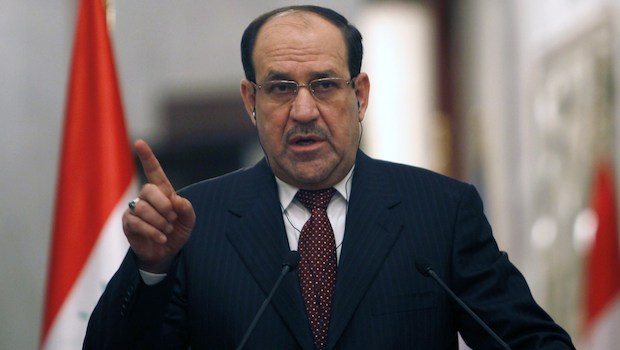
Iraqi Prime Minister Nuri Al-Maliki gives a joint press conference with United Nations Secretary-General Ban Ki-Moon (unseen) in Baghdad in this January 13, 2014, file photo. (AFP/Ahmed Saad)
Baghdad, Asharq Al-Awsat—Calls from Iraqi Prime Minister Nuri Al-Maliki on Tuesday for a state of emergency to be declared have split lawmakers across the political spectrum, as Al-Qaeda–linked fighters continue to make rapid strategic gains across the country.
The Iraqi prime minister urged the Council of Representatives—Iraq’s top legislative authority—to declare a state of emergency after fighters from the Islamic State of Iraq and Syria (ISIS) overran the city of Mosul, 250 miles (400 kilometers) northwest of Baghdad.
The Kurdistan Alliance, a coalition of the two leading Kurdish parties, announced its rejection of the prime minister’s call, saying that a declaration of a state of emergency would concentrate yet more powers in Maliki’s hands.
Maliki, who is serving as both the defense and interior ministers while also holding the prime ministry, is currently in heated negotiations to form a government following the April 30 legislative elections.
In comments to Asharq Al-Awsat a spokesman for the Alliance, Moayad Tayeb, said that “Kurdish MPs will not attend the emergency parliamentary session scheduled for Thursday, but they will vote against Maliki’s call for a state of emergency. We think that the current laws and procedures give sufficient room for the Commander in Chief of the Armed Forces to operate.”
“Declaring a state of emergency would, from our point of view, undermine the country’s democratic system,” he added.
The spokesman laid the blame for the current security crisis in Mosul on the “military leaders,” whom he accused of “negligence.” Tayeb called for these military officials to be held to account, maintaining that a state of emergency would not change the situation on the ground.
“Over the last period provided the military leadership with information about ISIS’s plan to occupy Mosul, but the leadership did not respond,” Tayeb claimed.
The other political blocs that said they opposed Maliki’s call include the Sunni-backed Mutahidoun and the secular-leaning Iraqiya.
Hamid Al-Mutlaq, an Iraqiya MP who is a member of the Parliamentary Committee for Security and Defense, said: “The problem does not lie in the state of emergency, because Maliki over the past years has been acting like the absolute ruler, constantly brushing the constitution aside.”
Mutlaq accused Maliki of “seeking to shirk responsibility through the state of emergency,” urging Iraq’s politicians to ensure those responsible are held to account.
Sadr’s Al-Ahrar bloc said it would only endorse the prime minister’s call on certain conditions.
“Al-Ahrar supports the declaration of a state of emergency,” Al-Ahrar MP Hakim Al-Zamli told Asharq Al-Awsat, adding that one of his bloc’s conditions was that Maliki “pledge to liberate Mosul within a maximum of 15 days.”
